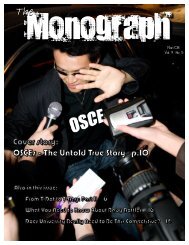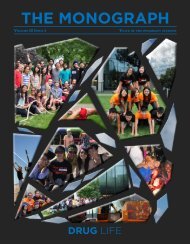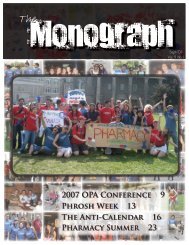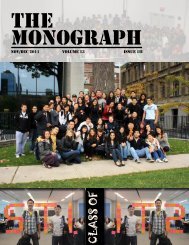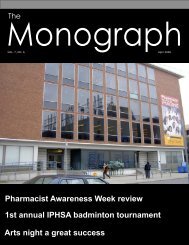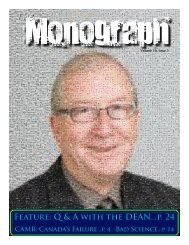March/April - University of Toronto's Undergraduate Pharmacy Society
March/April - University of Toronto's Undergraduate Pharmacy Society
March/April - University of Toronto's Undergraduate Pharmacy Society
You also want an ePaper? Increase the reach of your titles
YUMPU automatically turns print PDFs into web optimized ePapers that Google loves.
By: Matt Koehler, 1T0<br />
During PDW, Toronto was the host to<br />
several hundred pharmacy students from<br />
all across Canada. As one <strong>of</strong> the largest<br />
crowds at the conference gathered for<br />
the keynote address, Dr. James Orbinski<br />
inspired many students with accounts<br />
<strong>of</strong> his humanitarian experiences and his<br />
hopefulness. The true spirit <strong>of</strong> a health<br />
pr<strong>of</strong>essional was embodied though his<br />
unwavering compassion, leaving many<br />
students interested in becoming involved<br />
in international health work. This past<br />
summer I had the opportunity to partake<br />
in two international pharmacy related<br />
endeavours. In my preparation for these, I<br />
crossed paths with a number <strong>of</strong> dedicated<br />
and thoughtful pr<strong>of</strong>essors right here at the<br />
Leslie Dan Faculty <strong>of</strong> <strong>Pharmacy</strong> who are<br />
taking a part in global health development.<br />
I hope that highlighting activities <strong>of</strong> just<br />
some <strong>of</strong> the many pr<strong>of</strong>essors who have been<br />
active in this work will give you an idea <strong>of</strong><br />
how you can use your education to do the<br />
same. This is certainly not an exhaustive<br />
collection <strong>of</strong> noteworthy individuals, so I<br />
encourage anyone to follow up with more<br />
pr<strong>of</strong>iles in another article.<br />
Dr. Peter<br />
Pennefather,<br />
w h o s e<br />
background is in<br />
cell biology and<br />
neuroscience, is<br />
one <strong>of</strong> the friendly<br />
faces in second<br />
year medicinal<br />
chemistry. Now<br />
academic director<br />
<strong>of</strong> the Laboratory<br />
for Collaborative Diagnostics, Dr.<br />
Pennefather is working with the popular<br />
microbiology pr<strong>of</strong>essor, Dr. Ian Crandall,<br />
and computer systems engineer Dr. West<br />
Suhanic to create low-cost diagnostic<br />
technology platforms and health<br />
information communication strategies.<br />
Dr. Pennefather cited a dilemma<br />
with diagnosing malaria in developing<br />
countries because microscope bulbs were<br />
difficult to replace. Timely replacement<br />
bulbs for microscopes are near impossible<br />
in countries that lack infrastructure<br />
and effective supply chains. This, and<br />
similar issues have led Dr. Pennefather<br />
and his team to create an affordable and<br />
reliable telemicroscopy system where<br />
expert diagnosis can be made continents<br />
away, or even by automated computer<br />
s<strong>of</strong>tware. Another important aspect <strong>of</strong><br />
their innovations is to ensure devices can<br />
easily be maintained using parts available<br />
in domestic markets. This model was<br />
inspired in part by automobiles build in the<br />
1950’s still in operation in India and Cuba<br />
because <strong>of</strong> the availability <strong>of</strong> parts and<br />
ease <strong>of</strong> repair. Systems need to be simple<br />
enough such that users with limited IT and<br />
microscopy experience can manage their<br />
upkeep. And it’s amazing what used cheap<br />
consumer computer parts and memory<br />
sticks can be used for. The goal is to make<br />
the cheapest, simplest equipment carry out<br />
sophisticated diagnostic analysis.<br />
Working on projects such as Toronto’s<br />
interpr<strong>of</strong>essional pain curriculum<br />
sensitized Dr. Pennefather to collaboration<br />
issues across cultures and disciplines and<br />
the need to put the patient at the center <strong>of</strong><br />
care. Hence, he is also working with his<br />
team to find solutions for structuring and<br />
saving medical data in meaningful ways<br />
to allow health care delivery that can be<br />
individualized to the unique constraints<br />
that all care seekers bring, whether they live<br />
in high-income or low income countries.<br />
His laboratory (www.lcd.utoronto.ca) is<br />
exploring new ways <strong>of</strong> integrating primary<br />
health care informatics and global health.<br />
Diagnostic devices and global health<br />
data are all but simple systems. It’s said<br />
that it takes genius to turn a complicated<br />
system into something simple, but that’s<br />
just what the Laboratory for Collaborative<br />
Diagnostics lab strives to do.<br />
M o s t<br />
students at<br />
the faculty are<br />
already aware<br />
<strong>of</strong> Dr. Kohler’s<br />
work in global<br />
health through<br />
PHM227. With<br />
a background<br />
in political<br />
science, she<br />
is able to focus her work on intellectual<br />
property rights in the pharmaceutical<br />
sector. Dr. Kohler’s practical experience<br />
lends quite nicely to her current research<br />
at our faculty; she has worked as an<br />
advisor to governments for the World<br />
Bank and World Health Organization on<br />
pharmaceutical policy. Becoming acutely<br />
aware <strong>of</strong> the gap between pharmaceutical<br />
policy and utility in various countries,<br />
Dr. Kohler sought to focus her attention<br />
on developing access <strong>of</strong> pharmaceutical<br />
supplies globally, particularly in remote<br />
areas.<br />
With increasing drug costs in a highly<br />
complex pharmaceutical system, Dr.<br />
Kohler hopes to provide answers that guide<br />
difficult questions such as pharmaceutical<br />
resources allocation, good governance and<br />
drug pricing.<br />
Dr. Kohler focuses primarily on<br />
improving global access to medicines and<br />
leads the Initiative for Drug Equity and<br />
Access (IDEA) at our faculty <strong>of</strong> pharmacy.<br />
IDEA is focused on research and education<br />
on pharmaceutical policy and governance,<br />
and is carried out by a multidisciplinary<br />
research team <strong>of</strong> lawyers, economists,<br />
pharmacists and political scientists and<br />
students. For some time now she has<br />
been taking on undergraduate pharmacy<br />
students for internships and work-study<br />
positions with her team. Examining how<br />
benchmarking within the pharmaceutical<br />
industry acts as incentive for corporate<br />
social responsibility, and assessment<br />
<strong>of</strong> transparency in Nigeria’s public<br />
pharmaceutical sector as it pertains to<br />
vulnerability to corruption are examples<br />
<strong>of</strong> published research Dr. Kohler has<br />
undertook with undergraduate pharmacy<br />
students. She has also established<br />
relationships with several organizations,<br />
giving students an opportunity to complete<br />
summer internships at an antiretroviral<br />
therapy clinic in Namibia, a health care<br />
management and consulting firm in Costa<br />
Rica and the World Health Organization in<br />
Switzerland.<br />
Focusing on five underpinning<br />
issues <strong>of</strong> intellectual property rights,<br />
development assistance, corruption,<br />
governance and ethics, Dr. Kohler aims to<br />
tackle a central question – how to make<br />
access to pharmaceuticals more equitable,<br />
particularly for the world’s poor. M<br />
The Monograph - <strong>March</strong> 2010 17




